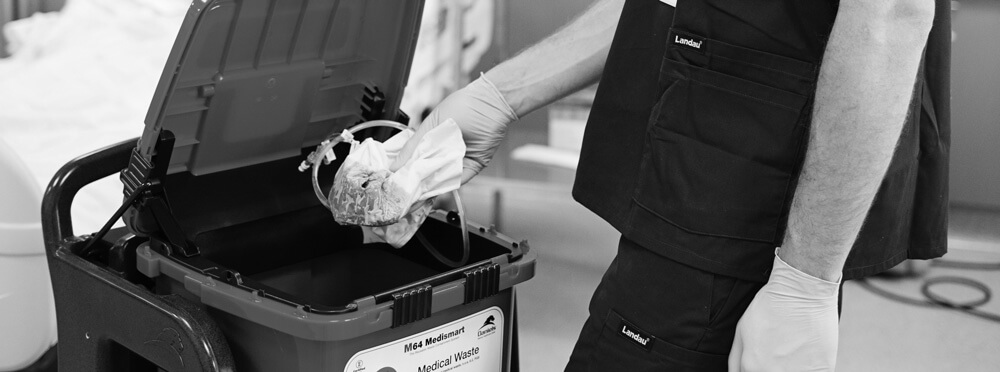Comprehensive Medical Waste Disposal Services for Healthcare Facilities
Comprehensive Medical Waste Disposal Services for Healthcare Facilities
Blog Article
Navigating Medical Waste Disposal: Necessary Providers for Medical Care Facilities
In the detailed landscape of healthcare operations, the management of medical waste is an essential aspect that requires meticulous attention. Healthcare facilities, whether small centers or big healthcare facilities, are delegated with the responsibility of handling, treating, and disposing of a large range of medical waste streams. The intricacies included in browsing via the governing demands, making sure appropriate waste segregation, and executing secure collection and transport processes are critical. Understanding the essential solutions that sustain medical waste disposal is not simply an issue of compliance but also a fundamental element in securing public health and wellness and environmental health. The ins and outs of this process are vital for medical care centers, and the experience used in this realm plays a crucial function in maintaining the honesty of health care systems.
Regulatory Compliance Support
For healthcare centers, making sure regulative conformity support is important to preserve proper handling and disposal of clinical waste. Abiding by regulations set forth by companies such as the Epa (EPA) and the Occupational Safety And Security and Health Administration (OSHA) is vital to avoid environmental contamination, shield public health, and prevent prospective lawful consequences. Regulative conformity assistance provides health care centers with support on just how to appropriately segregate, shop, transport, and deal with different kinds of clinical waste based on local, state, and federal regulations. This support consists of aid in creating and carrying out thorough waste management strategies, conducting regular staff training sessions, and performing audits to ensure ongoing conformity. By partnering with regulatory conformity specialists, medical care centers can remain updated on progressing policies, reduce dangers connected with inappropriate garbage disposal, and eventually add to a much safer and a lot more lasting setting for all.
Waste Segregation Advice

Healthcare facilities have to offer clear guidelines and training to personnel on how to segregate waste effectively. This includes separating basic waste from hazardous products such as sharps, transmittable waste, pharmaceuticals, and chemical waste. Color-coded bins, labels, and signage are frequently made use of to assist in waste segregation practices. Routine audits and monitoring of waste segregation procedures are important to recognize any type of issues and make required improvements.
Collection and Transport Solutions

Correct collection and transport solutions are crucial parts of the medical waste disposal procedure in medical care facilities. These services make sure that hazardous products are managed safely and in compliance with laws to shield both the setting and go public wellness. Health care facilities depend on specialized waste management business to offer effective collection and transportation services customized to their demands.
Medical waste collection includes setting apart various types of waste at the point of generation, using color-coded containers or bags to compare basic, hazardous, pharmaceutical, and other waste streams. Educated workers need to execute this job to avoid contamination and make sure appropriate disposal. When collected, the waste is carried in devoted lorries geared up to take care of hazardous materials securely. These vehicles follow rigorous safety requirements and adhere to designated paths to qualified treatment facilities for disposal via methods such as landfilling, incineration, or sterilization.
Treatment and Disposal Solutions
In the realm of medical waste disposal for medical care centers, after the critical phase of collection and transportation services, the emphasis moves towards applying reliable treatment and disposal solutions. Therapy services often entail processes such as autoclaving, which uses vapor under pressure to sterilize the waste.
Disposal options encompass the last action in the clinical waste management procedure. Facilities may opt for land fill disposal, where treated waste is thoroughly transferred in assigned locations. Medical Waste Disposal Services. Alternatively, medical care facilities can select to use waste-to-energy facilities, which incinerate waste to produce electrical energy. Recycling and source healing are additionally gaining grip as lasting disposal choices for sure types of medical waste products.
Reliable treatment and disposal options are extremely important in making sure compliance with regulations and guarding public health and the setting. Healthcare facilities should thoroughly assess and choose suitable techniques that line up with their waste administration goals and sustainability efforts.
Personnel Training and Education And Learning

To successfully handle medical waste disposal in health care facilities, detailed staff training and education play a crucial role in ensuring adherence to regulative requirements and maintaining a risk-free atmosphere. Correct training gears up personnel with the understanding read the full info here and skills needed to handle various kinds of medical waste, segregate them appropriately, and package them firmly for disposal. By educating staff members on the dangers connected with incorrect handling of clinical waste, facilities can reduce the chance of accidents, contamination, and governing infractions.

Final Thought
In conclusion, health care centers rely on vital clinical waste disposal solutions to ensure regulative conformity, proper waste segregation, risk-free collection and transportation, effective therapy and disposal, as well as personnel training and education. These solutions play an important duty in keeping the health and wellness of both health care employees and the basic public, highlighting the importance of correct management of clinical waste in medical care setups.
For medical care centers, ensuring regulatory compliance assistance is essential to maintain proper handling and disposal of medical waste. Waste segregation entails classifying different types of clinical waste to make sure suitable handling, treatment, and disposal. This consists of dividing general waste from hazardous products such as sharps, contagious waste, pharmaceuticals, and chemical waste.Medical waste collection entails setting apart different kinds of waste at the factor of generation, using color-coded bags or containers to distinguish between basic, dangerous, pharmaceutical, and other waste streams.In the world of medical waste disposal for healthcare centers, after the important stage of collection and transport services, the emphasis moves towards implementing reliable therapy and disposal services.
Report this page